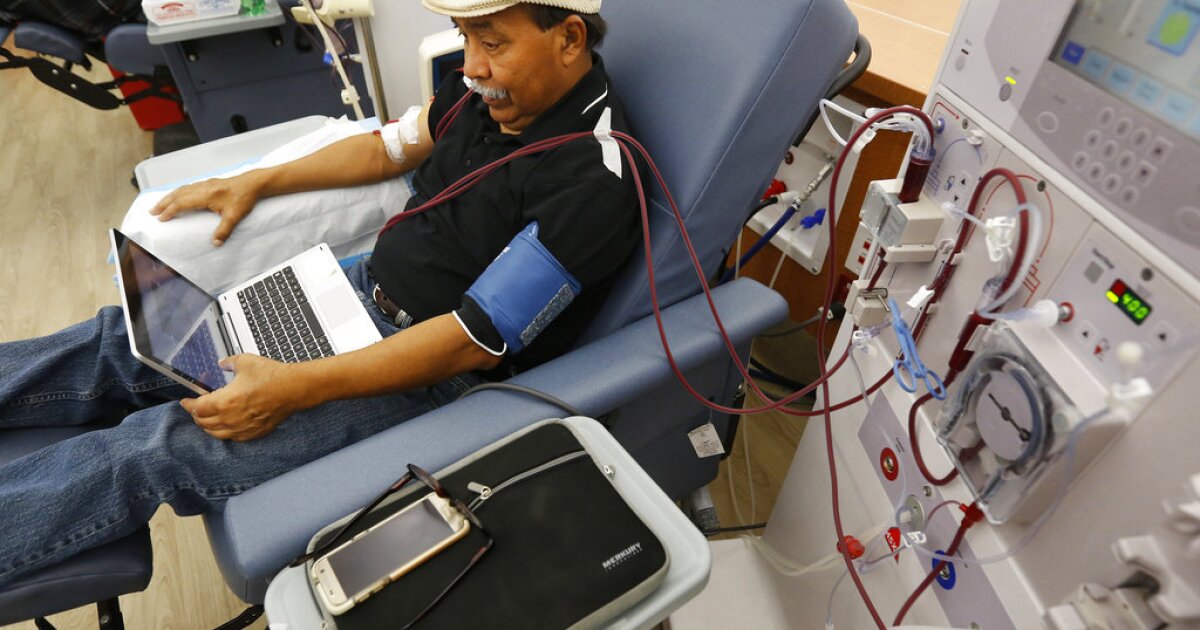

A California ballot measure that would impose new rules on kidney dialysis clinics across the state has pitted for-profit dialysis companies against a healthcare workers union, with collective campaign spending exceeding $94 million.
Proposition 29 would require the state’s roughly 650 dialysis clinics to have a physician, nurse practitioner, or physician assistant on-site during treatment, in addition to dialysis technicians. Clinics would also have to report dialysis-related infection information and disclose to patients a list of the people who own at least 5% of the clinic to the state, or face penalties.
Proponents, including the Service Employees International Union-United Healthcare Workers West, say that the proposition would improve patient care, while dialysis clinic companies say the requirements are unnecessary and would place a larger financial burden on them that could lead to some clinics closing their doors.
CLAIMS OF ABORTIONS AND TRANSITIONS FOR MINORS OVERTAKE MICHIGAN BALLOT POLITICS
Patients typically visit dialysis centers multiple times a week to undergo lifesaving treatment in which machines simulate the functions of the kidney, removing blood from the patient and filtering out extra fluid and toxins before putting it back in. Dialysis patients are generally overseen by their own physician, though the clinics carry out the treatment with kidney specialists. Under federal rules, physicians are required to visit their patients during treatment at least once a month.
Two private for-profit dialysis companies, DaVita Inc. and Fresenius Medical Care, have been the biggest opponents of the proposition, arguing that it would drive up clinics’ expenses, forcing them to reduce services or shut down, affecting patient care. The two companies have spent more than $76 million overall running ads on streaming platforms, televisions, and radio airwaves, outspending proponents of the measure by over nine times, according to the Los Angeles Times.
“This unnecessary requirement would cost hundreds of millions statewide, forcing dialysis clinics in California to cut back services or shut down, making it harder for patients to access their treatments — putting their lives at risk,” the No On 29 campaign said.
The proposition is likely to increase each clinic’s costs by several hundred thousand dollars annually on average, largely because of the additional staffing requirement, according to the California Legislative Analyst’s Office, a nonpartisan fiscal and policy advisory group to the state legislature.
The campaign that represents patients, doctors, nurses, and others opposing the measure claims that the measure is a part of a scheme by the union to pressure dialysis companies to let workers unionize. The campaign also suggests that having additional physicians on-site wouldn’t be beneficial, as kidney specialists and other specially trained healthcare workers would likely still be the ones to administer and oversee the treatment to patients.
Proponents say the proposition is a matter of patient safety and would lead to more transparency from dialysis companies.
“A doctor, nurse practitioner, or physician assistant on site will be able to respond to emergencies such as cardiac arrest, bleeding, dangerous fluctuations in blood pressure, and other common problems associated with dialysis treatment,” the Yes On 29 campaign said. “Currently, when serious problems occur most clinics just call 911, which puts patients at risk and contributes to ER overcrowding.
The Service Employees International Union-United Healthcare Workers West, which represents over 100,000 healthcare workers, patients, and consumers, has spent $8 million in support of the measure largely on “petition circulating,” according to the LA Times.
CLICK HERE TO READ MORE FROM THE WASHINGTON EXAMINER
The proposition marks the third consecutive general election that California voters have weighed in on changes to dialysis clinic operations, with both sides raising millions each time for their campaigns. A ballot measure in 2020 aimed to institute similar requirements for dialysis clinics as the present one and garnered over $105 million from the opposition and $9 million from proponents, though it was rejected by over 60% of voters.





